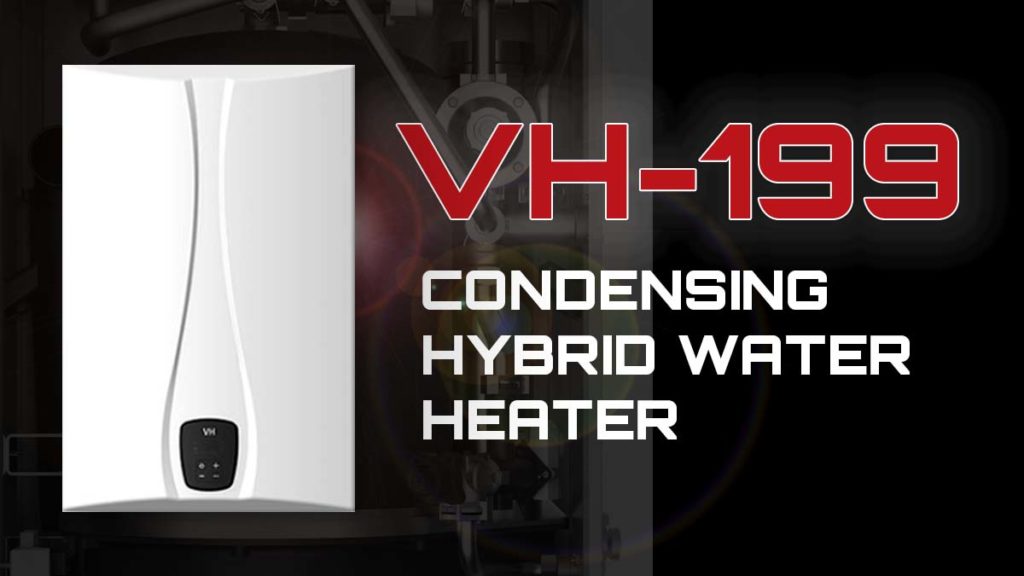Introducing the Hybrid Water Heater
Aristotle called it “the golden middle way.
Others have called it the “golden mean” or simply “the middle road.” Basically, it refers to the desirable middle between two extremes.
While this idea might make us want to reflect on the nature of our philosophy, economics, and politics, happily it applies to the small stuff in life too. Small stuff like… condensing hybrid water heaters!
(Didn’t see that coming, did you, Aristotle?) I digress.
Sometimes, when we’re confronted with two solutions that offer their own unique benefits, deep inside, we just wish we could have it both ways. Without a doubt, that would make things easier. The best of both worlds. This is what a Hybrid Water Heater promises to do for your water heating needs.
Hybrid Water Heaters: Best of Both Worlds
| Advantages of Tank | Advantages of Tankless |
|---|---|
| Immediate Hot Water | Energy Efficiency |
| Low-Pressure Drop | Endless Hot Water |
| No minimum water flow for operation | Compact Design |
| Constant Hot Water Flow | Consistent Hot Water Temperature |
To Tank or Not to Tank?
(or ‘Why the Hybrid Water Heater Was Invented In the First Place’)
Traditional tank-type water heaters offer hot water at a continuous pressure. But the downside is that they are not as energy efficient as they could be, and you run the risk of your tank running out of hot water if you use too much.
On the other hand, Tankless Water Heaters handle the limitations of tank water heaters by offering continuous hot water at high efficiency. Therefore, If sized correctly, you should never run out of hot water. Even so, one limitation is that these units may need to lower water pressure to keep water temperatures consistent.
All things considered, a hybrid tankless water heater solves these problems. Users get continuous, energy-efficient hot water and consistent water pressure. In sum, it’s truly the “middle path.”
Meet the Vesta™ Condensing Hybrid Water Heater (VH-199)

The VH-199 is Vesta’s answer to hybrid water heater technology. In short, it is an efficient, capable, and high-performing machine that provides exceptional comfort and value. Here are some of the features and benefits you can expect from the VH-199:
| Features | Benefits |
|---|---|
| Thermostat and Flow Activation | Best of both worlds. Continuous Hot Water + Consistent Flow Rate |
| Integrated 3-gallon stainless steel tank | Eliminates “Cold Water Sandwich” Effect |
| Indoor wall-mount or floor standing | Easier installation + more options |
| Compact size | Extra space in your utility room |
| Condensing Technology | Energy savings and reduced carbon footprint |
| Premium 304 High-Grade Stainless Steel Heat Exchanger | Longevity. 20+ year lifespan. |
| Safety devices | Peace of mind. Safe, reliable performance assured. |
| Natural Gas or Propane | Power of choice, flexibility. |
| “U”-shaped firetube design | Longevity. Allows firetubes to flex, preventing cracks in the weld |
How Vesta Hybrid Water Heaters Work
Hybrid Tankless Water Heaters have a small internal storage tank filled with warm water at all times. Therefore, when hot water is called for, the firetube heat exchanger only needs to heat the water from warm to hot (instead of ice-cold-to-hot!) Meanwhile, incoming water continues to pass through the heat exchanger and is released to the user at the set temperature. Furthermore, when the unit is at rest, the internal storage tank is refilled with water and kept warm, ready for the next user.
The system provides heat in response to water flow and thermostat control. Users enjoy the robust water flow of a tank system with the efficiency and continuous heat of a tankless water heater as a result.
The VH-199, like Vesta’s VRS and VRP units, are condensing. That is to say, that exhaust heat is recycled back up through the unit before exiting out the vent. Condensation takes place inside the unit and is then eliminated. Because condensation is acidic, the heat exchanger is stainless steel. Additionally, the exhaust is much cooler compared to non-condensing units (100℉ vs 300℉) and thus PVC pipe can be used for venting.
Vesta VH-199 Hybrid Water Heater Anatomy

1. Heat Exchanger

The Heat Exchanger is responsible for transferring heat to the water. Without a doubt, this unit is built to perform. For one thing, it is completely made of grade 316 stainless steel. It also contains 40 robotically double-welded U-shaped firetubes. The U-Shaped design of the fire tubes allows them to flex as they handle the demands of water pressure, combustion, and heating and cooling.
Additionally, a Water Separation Board inside the Heat Exchanger creates water turbulence, which lifts and flushes any sediment out of the bottom of the tank.
2. Burner

The VH is equipped with a metal fiber burner manufactured by BEKAERT Corp. What’s more, it is specially located in the unit to create 360 degrees of heat transformer. Finally, the burner is Eco-Friendly with a low NOx combustion.
3. Pressure Relief Valve

Next, the Pressure Relief valve keeps water pressure entering the unit at a constant 63PSI. This protects the system from pressure surges or high-water pressure, resulting in optimum temperature control.
4. HEX Thermostat

The HEX thermostat protects the Heat Exchanger from excessively high temperatures. E.g., if a temperature is too high for safe operation, combustion will shut off, and an error code will flash. Finally, after the unit is cools and is inspected, a Hard Reset is required to resume normal functions.
5. Air Pressure Switch

The Air Pressure Switch ensures the exhaust vent is free of blocks and debris. In any case the exhaust vent becomes blocked, the APS will stop combustion. Once the blockage has been cleared, it will automatically reset.
6. Control Board

The Control Board monitors and regulates every component in the unit. For this reason, it is strategically located as far as possible from incoming water and is water-proofed with epoxy coating. Also, dip switches are found here to control min. and max. fire and cascade settings.
7. Mixing Control Valve

The Mixing Control Valve ensures water exiting the VH leaves at the set temperature. In short, it constantly modulates and inserts cold water as necessary to keep the temperature constant.
8. Flow Control Valve

The Flow Control Valve measures incoming water temperature and calculates the flow rate of the water passing through. At 120% capacity, the valve will slow the flow rate to ensure consistent hot water is maintained.
9. Water Pressure Switch

The water pressure switch ensures water is present inside the unit and prevents the possibility of dry firing. If water pressure drops below 7psi, the switch is tripped. It will automatically reset once adequate water pressure is once again present inside the unit.
10. Gas Valve

The VH-199 is equipped with a simple negative pressure gas valve. No modulation or adjustment is needed; the solenoid simply opens or closes as required.
11. Condensate Trap

The condensate trap collects condensation, which is formed during combustion. There are sensors inside this trap to ensure water is always present.
12. Fan

The fan mixes the ratio of Air and Gas to achieve proper combustion and pushes exhaust gases through the hex and out of the vent.
Ensuring Your Safety with Thermistors

The VH contains four thermistors. They monitor the temperature in four key areas:
- Cold water temperature entering the unit
- Hot Water Leaving the water tank, but not yet mixed
- Hot water that has been mixing and is exiting the system at the proper set point
- The Exhaust Air Temperature
Final Thoughts On Vesta the Hybrid Water Heater
In conclusion, Hybrid tankless water heaters are a great option for those who want “the best of both worlds,” and the Vesta VH-199 is a high-quality, high-performing product in its category.
Above all, Vesta offers a great warranty and customer service to back its products. Users looking for a Condensing Hybrid Tankless Water Heater will be happy they chose Vesta.
Aristotle would be proud.
Please contact us if you would like to learn more about Vesta Hybrid Water Heaters, or download the brochure.

